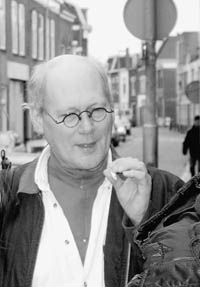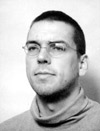xxx Profile of Paul Dijkstra of Utrecht: How an ideal is put into practice
Since the beginning of the eighties Paul Dijkstra has been looking after housing projects, artists, and squatters' collectives, and advising them on the purchase of properties, strategies for modernizing them, and on budgeting for projects. In 1994 he founded the consultancy de Verandering in Utrecht, which today has nine employees. Back in 1975, Paul Dijkstra founded the association de Vakgroep1, incorporating a large group of housing associations and enterprises. His work at de Verandering is bound up with working for de Vakgroep and the building up of Vereiniging Solidair. This work has its origins in the early 'sixties. Paul studied Dutch, first, then philosophy: 'I was an 'eternal student'. To make money I performed with friends as a stand-up comedian and had my own theatre company. I also developed a concept for a children's savings scheme for the Raifeisenbank. On top of that, I founded NIKE, the Dutch Institute for Creative Expression (Nederland Instituut voor Kreatieve Expressie) and taught elocution and creative expression. And I wrote a book on 'creative writing' before anyone else could step in and make something out of what was really my idea.' During the Vietnam War, Paul became active in the 'Third World' movement and became a member of the Afrika-Komitees. During the 'sixties he came into contact with Angolan freedom fighters: 'They said that the situations in Angola and Holland were products of the same system, the same society, and that Angola's struggle for a new society would be best supported by campaigning against the social structures in one's own country and seeking alternatives. I understood that I had to build up an alternative movement in Holland, independent from State and business, starting at the grass-roots and based on teamwork and solidarity among members. This idea was actually the starting point for de Vakgroep and still is the basic principle of initiatives such as Solidair. 'I once gave an interview; I don't know when anymore. It was about Regis Debray, Che Guevara, and supporting liberation movements in other countries. I was asked: if someone gave you a ticket and you landed in South America, and someone handed you a machine gun, would you join in the killing? My answer was, no; I'd bring the gun back to Holland and fight here, though of course with a different kind of weapon. Our society's weapons are money, organisation and power. Incidentally, they cut this part of the interview before it was published.' Eventually Paul Dijkstra went into secondary school teaching; a rather stormy period in his life in which he survived several headteachers and five applications for his dismissal. He allowed mopeds to be driven around in classrooms if that was the topic of the lesson, and on one day each week he would allow pupils to teach the teacher and each other - leaving it to the pupils themselves to choose the lesson's content. On a special day at the end of the school year, pupils organised an open-day. Various campaigning organisations and social groups filled the school with information stands. The pupils could in this way choose issues they wanted to know more about, and select the people who would then come in and lead a classroom session. So Dijkstra's concept of 'life and work' schools was first tried out in an ordinary classroom situation. He brought these ideas with him when he set up de Vakgroep, which could be seen as a 'school for young and old'. Today he wants to take this further, through his 'Institute for Mutual Learning and Research' or ISSO (Instituut voor Samen Scholing en Onderzoek), the idea being to create a residential and work centre in the 'Ganzennest' in Viller in northern France, where some members of de Vakgroep already live. Over the years, Paul Dijkstra continued to pursue his aims. Amongst other things he became a board-member of the development organisation NOVIB2 with all that that entailed, jetting from one international conference to the next: 'At NOVIB I felt I'd landed in a kind of 'talking shop' of several organisations. Everything was very abstract and there was a big distance to people's development in the Third World. The only people who really had anything to say were participants from women's organisations. It was at the point when everyone was required to organise themselves according to formal structures, which would start them on a 'long march through the institutions,' that I decided to leave the board.' But didn't working within the system present just as many possibilities as working outside of it? 'Well, it's like modern music, which isn't based on instruments but on endless possibilities of creating sound. Whereas a violin is a violin, and you can do a lot with it, though it remains a violin. You can become a virtuoso with a violin. What I mean is, the world doesn't function very well and I want to do something about it. In the end, it's all about organising a revolution! Not a revolution of the masses, but a revolution through the things people are creating together, which is people saying - look, this is possible. That's what this is all about, and that's why I'm still putting my efforts into it. The problem lies in the 'working together' aspect. In the context of self-government, you'll hear people saying 'myself', 'I this' and 'I that', and then 'you this' and 'you that'. As for getting together and working out what can be done jointly - no way! Ideas which might lead to team-work are never deemed good enough; people prefer not to act on them, and so end up doing nothing at all. If you don't take the first step, you won't get anywhere. You could say that, out of a whole kilometre, we have achieved the first ten metres. But at least that's ten metres. Without that first step, you won't move one millimetre.' One example is the housing project in Zeist which emphasizes 'social wealth' and the beneficial qualities of a functioning collective. What does this mean, and what do we need to both learn and do in order to achieve this? 'We have to stop lying to ourselves using nice words like 'autonomy' and 'consensus'. We have an incredible ability to hide our failures behind words. Giving it its real value; that is, turning the ideal into a practical reality, makes terribly high demands. Those who manage to do this can develop a real enjoyment of the collective, experiencing 'social wealth' in the sense of people really working together. Poverty will then become something that it is possible to bear with dignity instead of being an experience to be undergone under sufferance. Having no possessions is the ideal, and is my starting point with the ISSO project: the intrinsic worth in working together, the sustainability of social relationships, and so on. 'Wealth' lies in what you are and have together, and in how each one of us can personally benefit from this.' So, working and living
together is the ideal? 'Yes, but one shouldn't forget all those people who work for Shell
or for an estate agent who also thing the idea of self-government a good idea but never
took that first step. We should remain open to them and give them the space they need. It
isn't the case that all the 'best' people live in housing projects or are members of
action groups. Yes, these are good people; very good people. But there are good and very
good people in other places, and we should try to bring them together and create something
new. I don't mean creating political parties like Groen Links, but an independent network
of people who want to be active, or invest, in this field. But we have a long way to go.' 'I am convinced that there are people everywhere dealing with these kinds of issues. Rupert Sheldrake4 and the Resonans project are working on this principle, that people and groups everywhere are protesting and looking for solutions.' Would it not be an important task for Resonans to actively seek out these people and groups who are, in their similar ways, in search of an alternative society? 'Yes, and we must understand that we still have a lot to learn from others, for example from people in the Third World, the women's movement and various social groups. These societies or groups possess qualities which we have to regain if we want to achieve 'social wealth'. The big challenge for Solidair is to properly assimilate these into our modern, carefree lifestyle and into an active and tolerable daily existence, as an alternative to how we live today.' Notes:
|
|||
|
Jaap van Leeuwen is a consultant on sustainable technology with ADT (Advies Duurzame Technologie). He is a member of Solidair. | ||
| LINK
TO: www.solidair.nl |
|||
| | TOP | PRINT THIS PAGE | | |||
 Paul Dijkstra, now in
his sixties, has left his mark on the 'alternative economy' throughout the Netherlands.
From childhood, he was aware that children and adults perceived the world around them
differently. Adults seemed to respond and feel in a different way; they seemed to deal
with reality in a more superficial manner. He started a diary so that he would be
reminded, later, of what he thought of the world as a child. But, along with his diary, he
was to lose this recorded world-view.
Paul Dijkstra, now in
his sixties, has left his mark on the 'alternative economy' throughout the Netherlands.
From childhood, he was aware that children and adults perceived the world around them
differently. Adults seemed to respond and feel in a different way; they seemed to deal
with reality in a more superficial manner. He started a diary so that he would be
reminded, later, of what he thought of the world as a child. But, along with his diary, he
was to lose this recorded world-view.